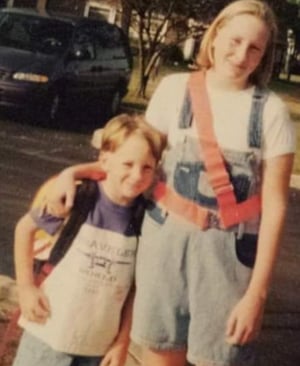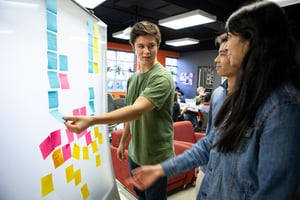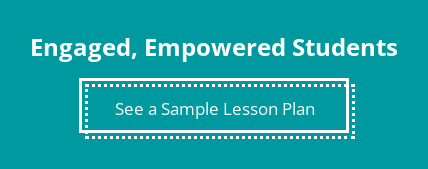I’ll never forget learning about lesson planning as part of my Secondary Education Minor in college. My brain lit up, my heart soared, and it felt as if my whole world started to make more sense. I realized that I had been “planning lessons” my entire life, without calling it that.
Growing up, I used to write out detailed schedules for my babysitting gigs, including when I’d watch my own brother. Even at age 12, I wanted to make sure my 7-years-younger brother was curious, challenged, and empowered - or at least that I could come up with enough fun stuff for us to do to tire him out for his afternoon nap. This was so much more than “playing school” to me - if you asked me, I was really doing school.
 As my brother’s full-time babysitter over our summer breaks, I’d write an entire week-long “curriculum” with daily schedules that included playing computer games, reading stories, taking field trips to the playground down the street, doing messy science experiments in our kitchen - which I’m sure our parents loved coming home to, making colorful artwork, baking afternoon snacks, and having recess in our backyard. I even “team taught” and set-up playdates with other babysitter friends in the neighborhood. Honestly it was some of the best educational stuff I’ve ever developed - because it was playful, engaging, and highly experiential.
As my brother’s full-time babysitter over our summer breaks, I’d write an entire week-long “curriculum” with daily schedules that included playing computer games, reading stories, taking field trips to the playground down the street, doing messy science experiments in our kitchen - which I’m sure our parents loved coming home to, making colorful artwork, baking afternoon snacks, and having recess in our backyard. I even “team taught” and set-up playdates with other babysitter friends in the neighborhood. Honestly it was some of the best educational stuff I’ve ever developed - because it was playful, engaging, and highly experiential.
Lesson Plan Development
Here’s what I’ve learned since age 12: Strong lessons are built backwards. A curriculum developer starts with the learning outcomes and end goals in mind first, then maps those big ideas to smaller concepts aligned with activities and assessments. In an experiential curriculum, learners have the chance to directly experience and apply concepts through projects, challenges, and real-world problems that connect to authentic assessments, providing learners with the opportunity to demonstrate their knowledge and competency. Dee Fink calls this Integrated Course Design, the framework and process for creating significant learning experiences. Essentially, as I’ve come to think of it, learning is one big theme party. Good teachers start with a theme, then build from there.
Entrepreneur Lesson Plans are Designed to Engage
At Uncharted Learning, our theme, or big idea, is that learning must go beyond a lesson plan to be part of students’ real lives. Our entrepreneurship lesson plans are designed to actively engage learners in re-imagining and re-shaping their worlds - identifying problems that they find important, generating actual solutions, and bringing their ideas to market.
 Entrepreneurship is a way to empower learners to chart their own course, and to inspire students from elementary, middle, and high school to recognize the potential impact of their ideas on the world around them. Through experiential entrepreneurship lessons, students in our programs also gain real skills and mindsets - like problem solving, creativity, collaboration, public speaking, and resilience - which they’ll need to thrive in an increasingly complex world and workforce.
Entrepreneurship is a way to empower learners to chart their own course, and to inspire students from elementary, middle, and high school to recognize the potential impact of their ideas on the world around them. Through experiential entrepreneurship lessons, students in our programs also gain real skills and mindsets - like problem solving, creativity, collaboration, public speaking, and resilience - which they’ll need to thrive in an increasingly complex world and workforce.
The high school entrepreneurship program offers a one or two year path, and classroom teachers are supported by a team of volunteer coaches and mentors to bring authenticity and real-world perspectives to the lessons.
The Understanding by Design (UbD®) Framework
Our entrepreneurship lesson plans are built using the Understanding by Design (UbD®) framework - a backwards planning process for mapping and aligning outcomes, activities, assessments, and standards. In our sample entrepreneurship lesson plan, you can see how we integrate enduring understandings and essential questions to guide teachers and students through the entrepreneurial journey.
When I stop and think about it, I still feel the same way about education as I did when I was 12: We’ve got to do more than play school. To truly unleash the curiosity, wonder, confidence, and agency of the next generation, we have to bring lesson plans to life for students - and that’s exactly what Uncharted Learning teachers do in our programs every day.
